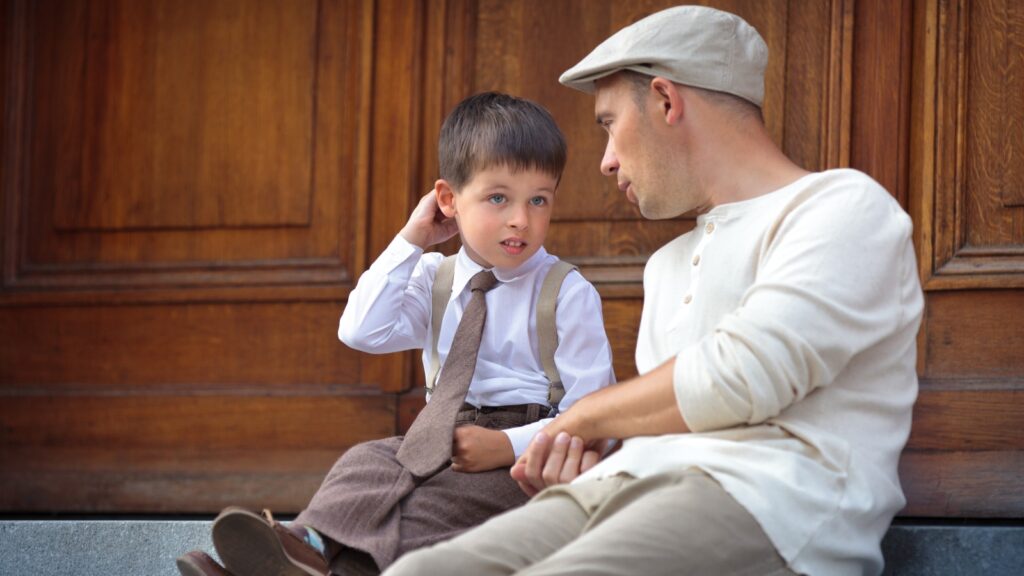As caregivers, our everyday choices can significantly impact our children’s futures. Reflecting on 20 common ways parents can unintentionally hinder their kids’ development sheds light on the importance of mindful parenting. From overlooking the significance of quality time to underestimating the influence of our words, these subtle blunders can accumulate over time, potentially shaping our children’s trajectories in ways we may not anticipate. Taking heed of these insights can guide us in fostering an environment conducive to our children’s growth and well-being.
Being Overprotective and Strict

Overbearing and excessively strict parenting can inadvertently foster dishonesty and secrecy in children. By constantly surveilling and micromanaging their every move, parents create an environment where children feel compelled to conceal their actions to avoid reprimand. Instead of nurturing integrity and openness, this approach instills a habit of deception and evasion, hindering the development of genuine communication and trust. True growth and character-building stem from nurturing an environment of honesty and transparency, not from suffocating control and surveillance.
Berate and Belittle

Berate and belittling children, when they share their thoughts, can damage their self-esteem and hinder future communication. Parents may later wonder why their adult children are distant or unresponsive. Gitnux reports that nearly half of all children in the United States experience their parents’ divorce, contributing to fractured family dynamics. With divorce rates ranging from 41-50% for first marriages, many children are raised in single-parent households. Additionally, a significant percentage grow up without their fathers, highlighting the diverse family structures prevalent in American society.
Constantly Worrying About Your Own Appearance

Persistently fixating on their appearance or critiquing others’ looks in front of children can significantly impact their self-perception. Constant exposure to such behavior may lead children to internalize unrealistic beauty standards and develop negative body image issues. Parents must model self-acceptance and refrain from engaging in harmful body shaming behaviors. Parents can help their children cultivate a healthy and positive self-image by promoting acceptance and emphasizing inner qualities over external appearances.
Punishing Them for Doing Something Good

Disciplining them for acting positively is counterproductive. For instance, when a child spends extended periods in their room during gatherings, then reemerges only to face ridicule from a parent like, “Oh, the cave dweller finally emerges.” Such remarks draw attention to the child’s absence and sow seeds of potential social anxiety. As reported by Statista, research indicates a decline in the average number of children per American couple from 2.44 in 1960 to 1.94 in 2023, underscoring the evolving dynamics of family size in contemporary society.
Thinking That They’re the Same Kid When They’re a Teen

Failing to acknowledge the natural evolution of their child’s interests and desires as they grow older can lead to conflicts and misunderstandings. Parents must recognize that their teenager is not the same person they were at eight. As children mature, their preferences and priorities evolve, requiring parents to adapt. Understanding and respecting their teenager’s individuality fosters open communication and strengthens the parent-child relationship, reducing tensions and promoting harmony within the family dynamic.
Arguing in Front of Each Other

Constantly engaging in arguments within the family and with others can harm children’s well-being and development. The Independent reported that families spend an average of 49 minutes daily embroiled in disputes, underscoring the prevalence of conflict in many households. Exposure to ongoing discord can create an atmosphere of tension and instability, impacting children’s emotional health and ability to form healthy relationships. Parents must model constructive conflict resolution and strive to create a harmonious environment conducive to their children’s growth and happiness.
Not Respecting Privacy

Respecting the privacy of children and teenagers is essential for fostering trust and healthy development. While it’s natural for youngsters to keep some matters private, not every secret harbors negative intentions. Constantly scrutinizing and assuming the worst about their privacy can breed trust issues in the future. Personal growth often stems from making mistakes and learning from them, a process hindered by an environment lacking respect for privacy. Encouraging open communication while respecting boundaries nurtures trust and supports children as they navigate through life’s challenges.
Force/Guilt Their Kids Into Hugging/Kissing/Touching People

Pressuring or guilting children into physical affection violates their autonomy and boundaries. Insisting they hug or kiss others against their will disregards their discomfort. It teaches them to ignore their own feelings for the sake of others’ comfort. Respecting their refusal, even if it’s a simple “I don’t want to,” validates their autonomy and teaches them to assert their boundaries. By prioritizing their agency over societal expectations, parents empower their children to advocate for their own bodily autonomy and respect others’ boundaries.
Acting Like Their Opinions Don’t Matter

Dismissing children’s opinions solely because they differ from ours undermines their sense of value and autonomy. Engaging in open dialogue and respectfully considering their perspectives fosters mutual respect and strengthens the parent-child bond. While ultimately, parents may have the final say, acknowledging their children’s viewpoints validates their sense of agency and encourages critical thinking. Parents empower their children to express themselves confidently and develop important decision-making skills by creating an environment where opinions are valued.
Every Time They Express Kindness to the Opposite Sex

Mocking or teasing children, particularly boys, when they display kindness towards someone of the opposite gender, can be detrimental. Such remarks, like “Is she your girlfriend?” accompanied by snickering, may discourage shy individuals and impact their self-confidence in future interactions. This constant teasing can plant seeds of insecurity, affecting their ability to form healthy relationships later in life. Encouraging respect and empathy in all interactions fosters emotional growth and helps individuals navigate social dynamics with confidence and kindness.
Isolating Them From Other Kids

Isolating children from their peers for extended periods through homeschooling without social interaction can impede their social development. Interacting with peers fosters crucial skills such as communication, cooperation, and conflict resolution. Children may struggle to navigate relationships and develop empathy without exposure to diverse social settings. While homeschooling offers personalized education, parents need to prioritize opportunities for socialization through extracurricular activities or organized social gatherings to ensure well-rounded development.
Praising Them for Their Intelligence, Rather Than for Working Hard

When children receive praise primarily for their intelligence, they may internalize a belief that they possess an inherent superiority over others, capable of excelling effortlessly. This perception ties their self-worth to intelligence and links it directly to their success. Consequently, many coast through high school, buoyed by accolades of their intellect. However, when faced with failure—a failed test, a job rejection—they confront a crisis of identity. Suddenly, they grapple with the realization that success demands more than innate intelligence; it requires perseverance and hard work, a lesson harder learned later in life.
Freaking out Every Time They Get a Bit Hurt

Overreacting to minor injuries can inadvertently teach children exaggerated responses to pain and distress. Youngsters often gauge their reactions to mishaps by observing their parents’ responses. If parents rush to comfort them at the slightest scrape, children may interpret the situation as more serious than it is and cry accordingly. Conversely, if parents remain calm, children are less likely to react dramatically. These learned reactions to stress can influence how children cope with challenges as they grow older.
Giving a Kid Anything They Want

Indulging every whim of a child can foster a sense of entitlement, leading to entitled attitudes in adulthood. Such over-pampering may instill the belief that they are entitled to constant gratification without effort. Conversely, stories of individuals who achieved greatness despite adversity highlight the value of resilience and hard work. While shielding children from hardship has merits, excessive protection can hinder their ability to independently navigate life’s challenges. Balancing support with challenges helps cultivate resilience and self-reliance in children.
Little Versions of Themselves

Attempting to mold children into exact replicas of themselves disregards their individuality and autonomy. Each child is a unique individual with their own thoughts, feelings, and aspirations. Expecting them to mirror their parents’ traits or follow the same path undermines their right to self-discovery and personal fulfillment. Parents need to recognize and celebrate their children’s individuality, nurturing their talents and supporting their dreams, even if they differ from their own. Embracing diversity within the family unit fosters a sense of acceptance and belonging.
Ignoring Signs of Mental Health Issues

Neglecting to recognize signs of mental health struggles and then feigning ignorance when they escalate to a crisis point is detrimental. Being attentive to changes in behavior or mood can help identify potential issues early on. Parents must create an open and supportive environment where children feel comfortable discussing their feelings. Ignoring or downplaying mental health concerns only exacerbates the problem, potentially leading to more severe consequences. Taking proactive steps to address mental health needs promotes well-being and resilience.
Not Saying a Word to Their Kids for Hours or Days at a Time

Remaining silent for extended periods without explaining the reason for their frustration leaves children feeling abandoned and confused. The absence of communication leaves them to speculate about what might have caused their parent’s silence, fostering anxiety and uncertainty. Understanding the importance of open dialogue is crucial in maintaining a healthy parent-child relationship. By explaining their feelings and concerns, parents can alleviate their children’s distress and strengthen the bond of trust and understanding between them.
Making Them Feel That They Owe You

Instilling in children a sense of indebtedness for basic care and nourishment undermines the fundamental responsibilities of parenthood. Providing for children’s needs is an inherent obligation upon becoming a parent. Guilt-tripping children for basic care perpetuates an unhealthy power dynamic and can lead to feelings of resentment and inadequacy. Parents should prioritize nurturing a loving and supportive relationship with their children, built on mutual respect and understanding, rather than fostering a sense of obligation or indebtedness.
Tell Them to Be Honest, Then Punish the Child When They Are

Encouraging honesty but punishing a child when they comply sends mixed messages and undermines trust. This paradox teaches children to lie to avoid punishment rather than foster accountability and understanding. Instead of grasping the lesson behind their actions and the necessary consequences, children learn to prioritize self-preservation through deception. To cultivate integrity and responsibility, parents must create an environment where honesty is valued and mistakes are seen as opportunities for growth and learning.
Make Promises They Don’t Keep

Whether positive or negative, consistency in keeping promises shapes a child’s perception of trust and reliability. Failing to follow through on a promised consequence can be just as detrimental as reneging on an anticipated trip to Disneyland. It breeds unpredictability, undermining the child’s trust in the parent’s word. This inconsistency blurs the lines of expectations, leaving the child uncertain about what to anticipate, ultimately eroding the foundation of trust in the parent-child relationship.
19 Grim Realities of Dating After 50 That Are Often Overlooked

19 Grim Realities of Dating After 50 That Are Often Overlooked
26 Things That Will Be Extinct Because Millennials Refuse to Buy Them

26 Things That Will Be Extinct Because Millennials Refuse to Buy Them
24 Outdated Slang Terms You Absolutely Shouldn’t Be Using Anymore

24 Outdated Slang Terms You Absolutely Shouldn’t Be Using Anymore
25 Hardest Parts About Getting Older That No One Ever Talks About

25 Hardest Parts About Getting Older That No One Ever Talks About




